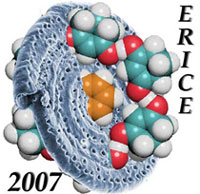


|
The course main aim is to revise the state-of-the-art
in design of new materials with properties of technological interest,
to allow a faster progress towards the rational design of these materials
in academia and industry. Besides, The course will attempt to establish
a common language between disciplines that are not traditionally in
close contact (materials chemistry, solid state reactivity, nanotechnology
and biotechnology). The scientific programme is focused on the modelling,
design, synthesis and applications of crystalline solids and on the
methods to understand and to exploit the resulting collective properties.
Top notch scientists will cover the most relevant aspects on molecule-based
materials, and discuss frontier problems for applications in magnetism,
conductivity and superconductivity, non-linear optics, drug delivery,
bio- and nano-technology. The course aims mainly at showing the potential
developments of molecule-based materials (magnetic, conducting, superconduction,
non-linear optical, bioltechnological…) and to foster new lines
of research aimed at the rational synthesis of these materials. An example
is the increasing amount of structural research on fullerenes and their
elongated (nanotube) derivatives, as they promise to play a major role
in several areas of modern technology from medicine to molecular electronics
and civil engineering; new molecule-based materials can also play a
key role in electronics and computers; another example is lithium batteries
and the importance of structure in their design, to satisfy the demand
for reliable and safe high energy-high power tools by the medical, transportation,
space and defense sectors.
|
